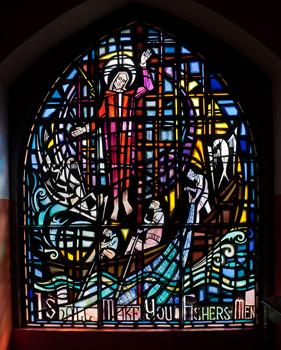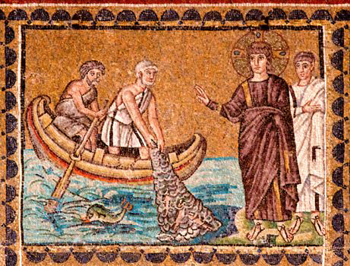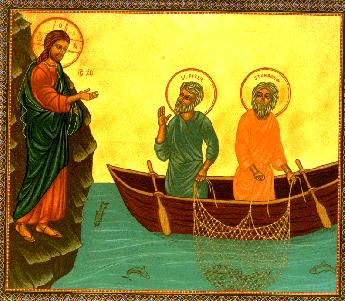For Sunday January 21, 2018
Third Sunday after the Epiphany
Lectionary Readings (Revised Common Lectionary, Year B)
Jonah 3:1–5, 10
Psalm 62:5–12
1 Corinthians 7:29–31
Mark 1:14–20
I’ve never enjoyed fishing. When I was a little girl, my father would take me along on occasional fishing trips, and I would invariably ruin them by asking the wrong questions: “Isn’t that hook hurting the worm? Look how it’s curling away from your finger — it’s frightened! What about the fish’s mouth? It’s going to have a bloody cut in its mouth! Daddy, wait — why is there no water in that bucket? Why are you letting the fish gasp like that? It’s still alive!”
Hard as I tried to enjoy the sunlight on the water, the cool ocean breezes, the satisfaction of a good catch, I just couldn’t get over what I saw as the essential violence at the center of fishing: a living creature offered up as bait. Another living creature torn by a sharp hook, or hauled out of its native element by net, and left to die for lack of air. Eventually, my dad took the hint, and my kid brother — who loves fishing to this day — took over as his seafaring companion.
All of that to say, I’m not the biggest fan of Jesus’s fishing metaphor in this week’s Gospel reading: “Follow me, and I will make you fish for people.” Or, as the popular Sunday School song puts it, “I will make you fishers of men, fishers of men, fishers of men. I will make you fishers of men if you follow me.” (Perhaps unsurprisingly, I had as many childhood questions about that song as I did about Dad’s weekend hobby: “Why fishers of ‘men?’ Why just men? What if the men don’t want to be fished? What if they like the water they’re in? How will they breathe if we catch them? Won’t they suffocate? And anyway, fish are for eating. Are we supposed to eat these people?”)
It didn’t help that when I first learned this Gospel story, it was framed as evangelistic in a very particular sense. The fish were lost souls, doomed to hellfire. “Hooking” them for Jesus — getting them to church, to youth group, to the altar; leading them to say the sinner’s prayer and accept Jesus as their personal Savior; insisting that only our version of Christianity held "The Truth" which would save them from damnation — was the only hope these poor fish had. So. Was I ready to give up everything, leave all I know and love, and follow Jesus? Was I willing to fish for lost souls? Or would I cling to my worldly nets, ignore Jesus’s call, and let countless sinners die without salvation?
 |
Gospel stories are challenging to grasp even at the best of times, but years of baggage like mine can make the task even harder. This week, I’ve tried to read Mark’s account of Jesus’s seaside call to Simon, Andrew, James, and John with fresh eyes, to notice what I might have missed before, and to learn from the wisdom of others who have engaged this text in the past and found it both compelling and beautiful. Here are two things I’ve discovered:
First, Jesus’s call in this story is specific and particular, rooted in the language, culture, and vocation his hearers know best. What metaphor would make more sense to four fishermen than the metaphor of fishing for people? Simon and Andrew would have understood the nuances of that metaphor in ways I never will. James and John knew from years of hard won experience what depths of patience, resilience, intuition, and artistry professional fishing require. These men knew the tools of the trade, the limitations of their bodies and the potential dangers those limitations posed, and the life-and-death importance of timing, humility, and discretion. Most of all, they knew the water. They knew how to respect it, how to listen to it, and how to bring forth its best in due time. When Jesus called these tried-and-true fishermen to follow him, they understood the call not a directive to leave their experience and intelligence behind, but to bring the best of their core selves forward — to become even more fully and freely themselves.
In other words, we don’t follow Jesus in the abstract. We don’t heed his call “in general,” as if Christianity comes down to nothing more than attending church or being a nice person. If we’re going to follow him at all, we’ll have to do it in the highly specific particulars of the lives, communities, cultures, families, and vocations we find ourselves in. We’ll have to trust that God prizes our intellects, our muscle memories, our backgrounds, our educations, our skills, and that he will multiply, shape, and bring to fruition everything we offer up to him in faith from the daily stuff of our lives.
To the engineer, maybe Jesus says, “Follow me and build my people.” To the visual artist, “Follow me and paint the colors of the kingdom.” To the stay-at-home parent, “Follow me and nurture my children.” To the dancer: “Follow me and dance the Spirit.” To the physician, “Follow me and heal broken souls.” To all of us: “Follow me and I will make you…” This is a promise to cultivate us, not to sever us from what we love. It's a promise rooted in gentleness and respect — not violence and coercion. It's a promise that when we dare to let go, the things we relinquish might be returned to us anew, enlivened in ways we couldn't have imagined on our own.
 |
Most importantly, it is a promise from God to us — not from us to God. As Barbara Brown Taylor so aptly puts it, Mark 1:14–20 is a miracle story. Jesus calls, and the four fishermen “immediately” follow. No hesitation, no questions asked. Is this because they’re men of superhuman courage or prophetic foreknowledge? Of course not. These are the same guys who later in the Gospel doubt, deny, and abandon Jesus. They’re as fallible and as ordinary as the rest of us, and their own volition can’t get them very far. No, they immediately follow Jesus because Jesus makes it possible for them to do so. “This is not a story about us,” Taylor writes. “It is a story about God, and about God’s ability not only to call us but also to create us as people who are able to follow — able to follow because we cannot take our eyes off the one who calls us, because he interests us more than anything else in our lives, because he seems to know what we hunger for and because he seems to be food.”
What bothered me as a child — and bothers me still — about the fishing metaphor is that we so easily misinterpret it to mean that we have the power to “hook” or to “catch” others for God. We don’t. We are not called to cajole, manipulate, trap, bully, or even persuade others to “accept” Jesus, or join our religion. It is God alone who captures the imagination. God alone who makes the vision of his kingdom come alive in a human soul. All we can do is embody the vision in the particulars of our lives, reflecting into the water the profound beauty of who Christ is. The rest is utterly up to God.
The second discovery I made about this week’s Gospel story comes from the fascinating research of K.C. Hansen, who describes the socio-economic and political context of Jesus’s ministry in his article, “The Galilean Fishing Economy and the Jesus Tradition.” According to Hansen, the four fishermen in Mark’s story weren’t individual workers in a free enterprise system. By the time Jesus started recruiting disciples, the fishing industry in Palestine was fully under the control of the Roman Empire. Caesar owned every body of water, and all fishing was state-regulated for the benefit of the urban elite. Fishermen couldn’t obtain licenses to fish without joining a syndicate, most of what they caught was exported — leaving local communities impoverished and hungry, deprived of the dietary staple they had depended on for centuries — and the Romans collected exorbitant taxes, levies, and tolls each time fish were sold. To catch even one fish outside of this exploitative system was illegal.
 |
In this context, what was Jesus saying when he invited the four fisherman to leave their nets and “fish for people?” In his book, Binding the Strong Man, theologian and activist Ched Myers argues that we narrow and distort the radical nature of this text when we interpret it as an invitation to issue altar calls. Jesus was not talking about filling pews or baptismal fonts; he was hearkening back to the Hebrew scriptures, in which “the hooking of fish” is a euphemism for judgment upon the rich (Amos 4:2) and the powerful (Ezekiel 29:4). In other words, when Jesus asked Simon, Andrew, James, and John to “fish for people,” he was asking them to cast aside the existing social order of power, privilege, exploitation, and domination, and to help usher in God’s kingdom — a kingdom of justice for the poor, mercy for the oppressed, and abundance for all. He was, in Myers words, inviting commoners “to a fundamental reordering of socio-economic relationships.” To a new and God-honoring way of life that would bless all people.
In the end, Jesus’s proclamation is Gospel, or “good news.” If it’s not good news, it’s not God. If it’s not good news for all — it’s not God. Evangelism becomes abusive when we individualize it for our own convenience, severing it from its social, economic, and cultural context so that nothing in our comfortable lives needs to change. It becomes abusive when we focus on numbers, formulas, and institutions, forgetting that Jesus came to call people. “Fish for people.” People who are caught in the nets of exploitation, corruption, poverty, war, exile, homelessness, violence, disease, climate change, racism, sexism, homophobia… the list goes on and on and on. What would count as Good News for them?
The four men “immediately” left their nets and followed Jesus. In time, they made the Gospel their own, sharing its radical power through the details of their own lives and stories. What is the Gospel according to you? What is your Good News, and how will you share it in the turbulent waters of your time and your place? “Follow me and I will make you…” Jesus is trustworthy. He will.
Image credits: (1) Wikipedia.org; (2) St. Maria of Paris Orthodox Church, Cleveland, Tennessee; and (3) Church of the Holy Communion, Memphis, Tennessee.





